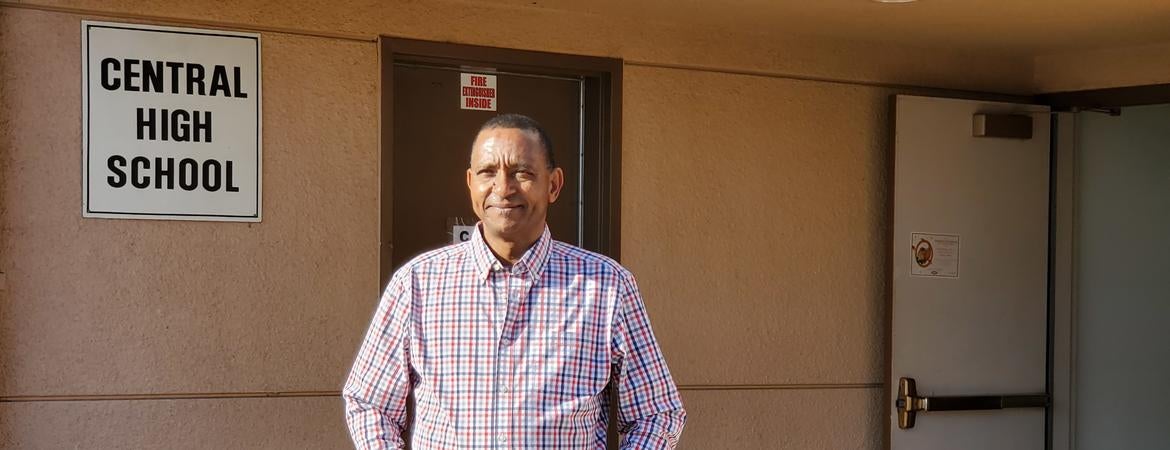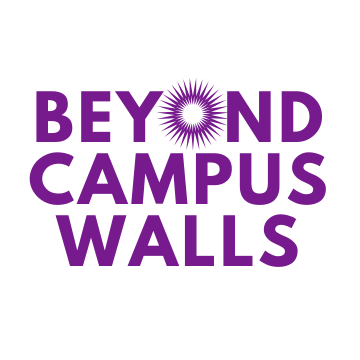College of Humanities, Arts, and Social Sciences

“In my life, I received help from all kinds of good people to get where I am now, and I am determined to pay it back anyway I can,” said Assistant Professor of Anthropology Worku Nida.
For the past three years, Nida has been traveling to Central High School, an alternative school in Los Angeles, to work with students who have been kicked out of their primary high school.
Bi-weekly, Nida visits the school to teach and mentor students who have found difficulty in traditional classrooms in the hopes of making a difference. Nida takes the same lectures he gives to UCR students and tailors them to relate to the high school students, teaching topics of gender, race, power, and agency.
“I ask them, ‘What do you want to talk about next week?’ and they say gender or race or culture, any topic,” Nida said. “I will use the material that I use here at UCR to make connections to their own lives. When we talk about these structures of power like race, gender and sexual orientation, it allows them to talk about their own lives, because their own lives are structured by labels that society has created.”
Nida’s involvement with the school began when he met one of the primary teachers, Vitaly, at a social justice event. After exchanging information, Nida visited the school and immediately felt a connection with the students.
“The students come to our program with a range of challenges and traumas, often with a sense of alienation from adults and social institutions,” said Vitaly. “The curriculum is largely student-directed, and consensus decision-making is an integral part of how we build a sense of classroom community and come to understandings and decisions about who we are, what we need, and how to achieve it.”
“These kids are first-generation and marginalized,” Nida said. “Most of them are racial and ethnic minorities. They are marginalized on so many levels, and I can relate to their experience, as a first-generation student to go to high school and college. I didn’t have a role model, I didn’t grow up reading books and I can really relate to their struggles. This space gives me an opportunity to help, to make a difference in these kids’ lives. They are smart, really smart kids but they don’t have the resources.”
An art project the students were engaged in, assigned by one of their other school teachers, is now displayed at the Fowler Museum at the University of California, Los Angeles. This impressive display highlights how truly unique the students are.
“It’s so rewarding and empowering [to see the students thrive],” Nida said. “It gives you the feeling that you are relevant. I am relevant to these kids’ lives. I’m helping them to see their lives in a new way. I’m here in a position to guide other young people in their life journeys, and I am trying to make a positive impact.”
Nida’s work caught the attention of Milagros Peña, UCR Professor of Sociology and Ethnic Studies and Dean of the College of Humanities, Arts, and Social Sciences. Peña recently visited the school and shared her own stories with the students.
“For me, having grown up in an inner-city environment, it was interesting to see what he was doing,” Peña said. “I shared with the students that I came out of similar neighborhoods where, community organization is an integral part of providing a space for students to learn and experience learning in a non-traditional setting, and how that is affirming of one’s beliefs and one’s potential. Something that was really inspiring to me was how receptive they were that I could be in their space. I felt very humbled and privileged that the students felt comfortable bringing me in.”
“ Due to their sessions with Professor Nida, these students have truly transformed their lives,” said Vitaly. “They have improved their self-esteem as well as their academic performance in other classes...It is real positive changes in the lives of students that make what Professor Nida does with students so invaluable...He communicates complex concepts clearly and is able to help students relate the material to their own lives, which they find empowering and illuminating...I am grateful to Professor Nida for his time and I look forward to continuing to work with him.”
Nida and Peña have brought UCR to the students but now hope to bring the students to UCR. The pair are working with Central High School to organize a field trip that will bring the students to Riverside and show them around campus.
“It’s an ability for us to share our space here,” Peña said. “We can share that there are students here who also come from our backgrounds and that UCR has an affirming presence for students who come from all kinds of backgrounds.”
Central High School students will be visiting during the winter quarter, and Nida is hopeful they will use this opportunity to foster relationships with UCR students.
“I am trying to bring the university to the community and the community to the university,” Nida said. “I’m an anthropologist by training, and I am trying to make anthropology relevant to the real world. It’s important to make a difference in real-world, social programs.”
FEATURED PHOTO. Photo courtesy of Worku Nida, Assistant Professor of Anthropology.
Professor Worku Nida stands outside of Central High School, the alternative high school in Los Angeles where he donates his time.
